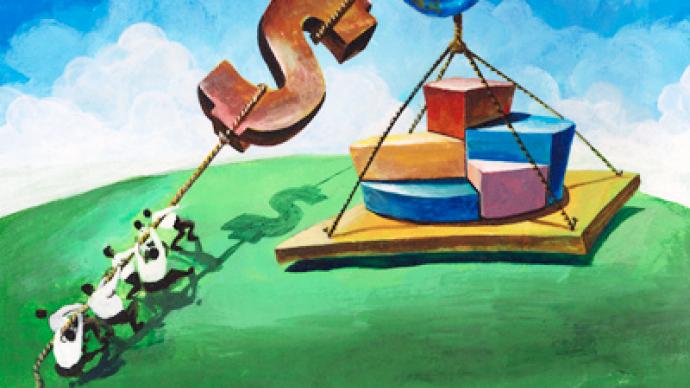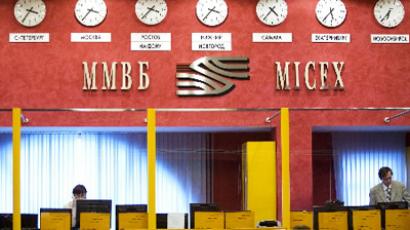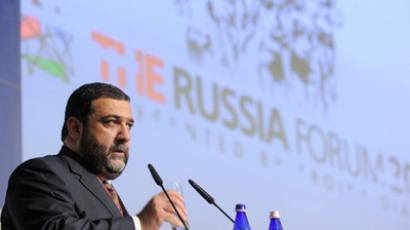Global imbalances and Russia

At the Troika dialog Russia Invest Forum 2011 Business RT spoke with Columbia University Professor, and former World Bank Chief Economist, Joseph Stiglitz about imbalances in the global economy.
RT: You spoke about imbalances during your speech, that basically what is good for Russia – commodity prices, as we have heard from Mr Kudrin, that’s helping the budget reducing the deficit and everything, at the same time in the U.S. they are spending more on energy, and spending less at home.How do we actually solve this problem of imbalance?JS: “Well that particular one, the united states needs to become less dependent on imported oil, energy, mainly by pushing conservation.Less dependence on fossil fuels, but most importantly, more energy efficiency, and that means also redesigning our cities, and redesigning our production process.For the long run, in a more broader scale, the problem in the United States, of global imbalance, is that we save too little.Before the crisis the household savings rate in the United States was zero, some quarters negative.It’s obviously not sustainable.Since the crisis it has gone up, but still not enough, and although household savings has gone up to around 5%, public savings has gone down, a national deficit, fiscal deficit, of around 10%.So in terms of the overall savings rate of the economy we haven’t improved.We’ve just shifted from one side to another.”RT: Do you think there is a risk of a double dip? JS: “I don’t think in the United States, there is much of a risk of a double dip, but, almost certain, of a decline in growth rate.When it will set in isn’t clear.And we’ve gotten a little bit of a boost, because the payroll tax cut, which was just enacted.So that payroll tax cut is another, you might say, artificial, support – good thing to do – but it was only for one year.And that’s means at the end of the year, if its not renewed, the negative forces, the constraints on states and localities, the continuing problems of over leverage on the household sector, continuing problems of financing states and local governments, the negatives will become predominant, and almost surely growth will slow.”RT: What do you think about Russia’s economy?It’s been talking about going away from commodities, going away from being an energy based economy, being integrated in the global community and the global financial world.Do you think that is actually possible with the problems that it actually acknowledges of administrative barriers and internal transparency? JS: “It clearly is possible, but it’s very difficult, and, to achieve that, some things have to be overcome.You mentioned a couple, I would add one or two more.One of the problems that almost all resource rich countries have, is the exchange rate gets very high.And at a high exchange rate, it’s very hard for exporters to compete with other exporters from other countries, or importers, or import substitution industries to compete with a flood of imports.So all over the world, resource rich countries become what I call rich countries with poor people.Countries that are not able to sustain the diversified economic base that is necessary for long term growth and stability.”RT: All together there is all this talk about emerging markets being the most important players in the world and driving global growth, do you agree with that?JS: “Yes, it’s very clear that for the next many years Europe and America are going to be facing problems, that we aren’t going to be able to solve those problems.We may be able to grow, but growth will be so anemic that we won’t be able to get our unemployment rate down, and it won’t be the kind of robust growth that would be an engine for global growth.To put an example, of a number that I think is quite striking to me, right now China contributes more to global savings than the United States.China is a third the size, but because it is saving so much, it’s actually providing more savings, which is the fuel for global investment, for global growth, than the United States.And this is likely to continue.So I think that’s right that we will be looking to emerging markets to provide the driver of growth, certainly over the next half decade.”RT: For a long time the United States have been the drivers of global financial policy, so its like a unipolar world.Do you think that, right now, everyone is calling for a multipolar world after this crisis which has proven that some things need to be change, who will be there to discuss, to make these critical decisions.The G-7, the G-20?JS: “The change in the global economy has been dramatic.It makes no sense, in my mind, in the 21st century to have a single currency, the dollar, to play the role that it does, a reserve currency.Especially because macroeconomic policy in the United States has been, quite frankly, a disaster.We’ve had the crisis, U.S. mismanagement has caused volatility all over the world.So if you had a country which was managing its economy in a very stable way, maybe like Switzerland, maybe you could say OK, we can rely on that, but not on the United States.So we have to move away from that framework to a multipolar framework.Another question is who would do that, how would that be managed?My own view is that it’s going to be very difficult.The G-20 will get everybody together, but the divergences of interest and perspectives are so great, that there will not be unanimity, the kind of unanimity that’s required for the G-20 to take action.So there is growing recognition that the way forward is for the G-20 to abandon the principle of unanimity and move towards the principle of broad consensus, we could sometimes call it a coalition of willing – that if you get a large number of countries that agree on climate change, like in Kyoto, go ahead and do it, even if the United States doesn’t go along, then you exercise peer pressure.There is a broad consensus on financial transactions tax, the United States is a big voice against it.Well, lets ignore the United States, lets have those countries that recognize the role that it can play, in restructuring their economies, and providing money for things that are needed.Go ahead and do that. And the same thing about creating a global reserve system. Actually this is a principle we understand, the WTO does not have universal membership, and it’s a club that countries increasingly want to join, and its becoming more universal.That’s the model that we need to use going forward.”RT: Finally, where do you see the principle risk to the global economy being right now? For example Nouriel Roubini has been saying that a risk is that the G-20 might go down to a G-0 without anybody being able to move economic policy unilaterally. JS: “Oh, he’s absolutely right that if we continue going down the road of unanimity, it will be the G-0, and, to be frank, I am not sure that there will be the willingness to go through the kind of framework of broad consensus that I’ve advocated.So, on that score,think he is right, the likelihood of the failure is very high.The point is, though, the failure of the global community to solve a lot of its problems doesn’t immediately lead to disaster, it just means that we will have a less prosperous global economy, and a more unstable global economy.So one way of interpreting the question within the next year or two – where do I see the greatest risks? Over the long run the failure to deal with the problem of global imbalances does pose a serious risk, but I don’t think it is going to manifest itself as an immediate problem in the next year.What will be a problem in the next year, that does represent a risk, is high food and energy prices.There are some interpretations of the 2008 crisis, is that it was the high food and energy prices that really precipitated that crisis, because central banks had to respond, and when they raised interest rates – a game that worked when there was low interest rates – the sub-prime mortgage fell apart.So to me that represents probably the most imminent risk.The difficulties that countries all over the world managing that particular risk."














